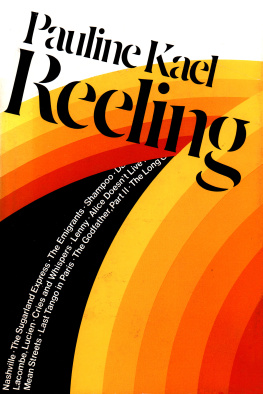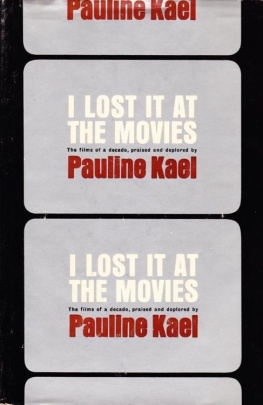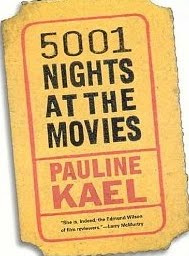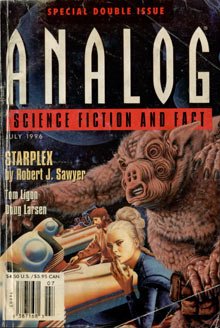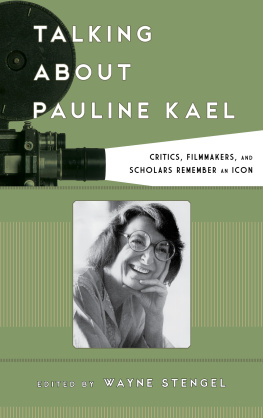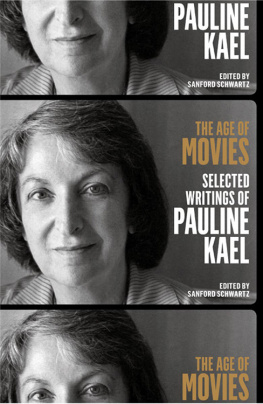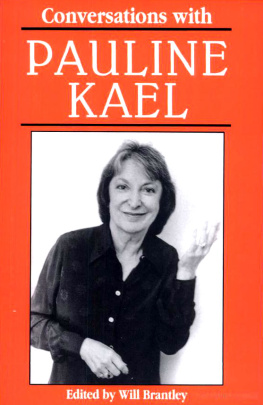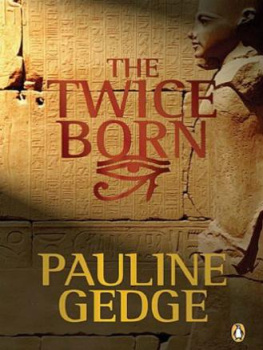Pauline Kael - Reeling
Here you can read online Pauline Kael - Reeling full text of the book (entire story) in english for free. Download pdf and epub, get meaning, cover and reviews about this ebook. year: 1976, publisher: Atlantic Monthly Press, genre: Detective and thriller. Description of the work, (preface) as well as reviews are available. Best literature library LitArk.com created for fans of good reading and offers a wide selection of genres:
Romance novel
Science fiction
Adventure
Detective
Science
History
Home and family
Prose
Art
Politics
Computer
Non-fiction
Religion
Business
Children
Humor
Choose a favorite category and find really read worthwhile books. Enjoy immersion in the world of imagination, feel the emotions of the characters or learn something new for yourself, make an fascinating discovery.
- Book:Reeling
- Author:
- Publisher:Atlantic Monthly Press
- Genre:
- Year:1976
- Rating:3 / 5
- Favourites:Add to favourites
- Your mark:
- 60
- 1
- 2
- 3
- 4
- 5
Reeling: summary, description and annotation
We offer to read an annotation, description, summary or preface (depends on what the author of the book "Reeling" wrote himself). If you haven't found the necessary information about the book — write in the comments, we will try to find it.
Reeling — read online for free the complete book (whole text) full work
Below is the text of the book, divided by pages. System saving the place of the last page read, allows you to conveniently read the book "Reeling" online for free, without having to search again every time where you left off. Put a bookmark, and you can go to the page where you finished reading at any time.
Font size:
Interval:
Bookmark:
Once, as I recall, a TV host showed footage from afilm he was involved in and asked Mel Brooks for an opinion, and Brookssaid solemnly, Well, its the sort of thing that has to be tried over andover again until its abandoned. Thats how I feel about TheGambler. Theres dedication in it, and a lot of skill. Karel Reiszdirected the picture with a smooth proficiency that doesnt come easy;James Caans central performance gives it backbone, its strikingly welledited, and its dramatically supercharged and compelling. For what it is,it is extremely well done. Its what it is that wont do. The screenplay an original by James Toback is a young writers egocentric conception ofwhat a film should be. There are a lot of characters, but there is reallyonly one, and he is the authors surrogate, the brilliant young Jewishprince, professor of literature to ghetto blacks, potential great novelist,and gambler. The conflicts are in his psyche, and theyre spelled out forus in his discussions of will and Dostoevski with his students at CityUniversity. The gambler, Axel Freed, is as flamboyantly superior as NormanMailers Rojack. Toback (its his real name) shares Norman Mailersidentification with Dostoevski, and he identifies with Mailer, too. Theprevailing tone of The Gambler is Mailerian dread, abetted by JerryFieldings elegantly oppressive score, which is based on the Symphony No. 1by Mahler. The script must have looked stunning on paper, becauseeverything is prepared for, structured, explained. The whole movie isexplicit: Axels guilt, his relationship with his intelligent,what-did-I-do-wrong doctor-mother (Jacqueline Brookes), his relationshipwith his rich merchant-king grandfather (Morris Carnovsky) and with hisworshipful girl (Lauren Hutton). The author appears to think that he knowswhat everything up on the screen means, and that its his task to tell us.Axel is as conscious as Toback, and so he explains his compulsion to testhimself to the limit and explains the secret of gambling that gamblersgamble to lose. Superficially, its devastatingly logical, and its tied ina neat, airless package and I dont believe a word of it.
Its like listening to a bad novel: every action has its inflatedcommentary. A thug (Burt Young) terrorizes a welsher, breaking his arm, andAxel takes the thugs pulse in order to explain to us that it hasnt goneup so much as a notch. Living under threats of violence himself, Axel goesto his grandfathers eightieth-birthday celebration and makes a dazzlingspeech about the old king; the party becomes Axels triumph. Toback maythink that this movie is about Jewish guilt, but it looks more like Jewishshowing off (which he ought to feel guilty about) Jean Renoir hasoften said that when a movie spells everything out, the public has nothingto add and theres no collaboration. The big difference between TheGambler and Robert Altmans California Split is not just thatAltmans allusiveness is vastly entertaining, while The Gamblerseeks to impress us, but that California Split invites us into theworld of its characters, while The Gambler hands us the wrappedpackage and closes us out. There is one scene in California Splitwhich bothered me the restaurant meeting between George Segal and hisbookie (Joseph Walsh). The scene is very well acted, but it isnt organic,in the way the rest of the movie is; its literary in structure, and it hasa different kind of intensity. California Split takes us right intothe middle of the action, but that scene belongs to the world of first actsand third acts, with their phony explanations. That scene suggests what allof The Gambler is like. This picture is complete without us, andtheres nothing for us to do except receive it, feel wiped out, andgenuflect. In Bay of the Angels, as in California Split, weshared in the highs and lows of gambling; for those of us who arentgamblers it was a heady sensation, like entering a foreign culture. AtThe Gambler, were trapped at a maniacal lecture on gambling asexistential expression.
And, as almost always happens when a movie is predictable and everything isanalyzed and labeled, the actions and the explanations arent convincing.Gambling is too easy a metaphor for life; as metaphor, it belongs to theworld of hardboiled fiction. I dont believe, for example, that the secretof gambling is that gamblers are self-destructive people who want to lose.I think gambling is a hell of a lot simpler for most people: theyrelooking to win. The poor bastard who buys a two-dollar ticket he cantafford is hoping to change his life with the two dollars. How else can hechange it? Theres no one reason people gamble. Some do it because theyenjoy it, and the losses are part of the game; some win fairlyconsistently, while others win and walk away with their winnings. Probablysome are asking whether God loves them, and if they win they feel chosen,while others are driven to lose. This pictures secret of gambling ispart of its rigid, schematic point of view. Toback is generalizing from hisexceptional-man conceit: Axel is such a superman he could win too easily,so his failures are regarded as willful. The Gambler is likeCrime and Punishment written by Raskolnikov at the time he went into kill the old pawnbroker. He had everything worked out, too.
James Caan sustains the grandiloquent terms set for the two-fisted,Renaissance-man hero his pride, his prowess, his compulsiveness andCaans oversized head and top-heavy frame seem especially right for Axel.The actor has to stay clenched, the bit in his teeth: and uncalculated moveand the pictures tension would collapse. Its an impregnable performance;even in the near-ludicrous Harlem scenes at the end, Caan commands thescreen by his hammer-and-tongs concentration. (Elliott Gould, inCalifornia Split,takes it by his relaxation by playing in his ownkey, with Altman harmonizing.) Caan is asked to bring off some feverishoverreaching. Having lost heavily all night, Axel offers to bet a kid hislast twenty dollars on a basketball shot; when the kid says he has only adime, Axel puts up his twenty anyway, and loses. Thats a Toback Mailerism the gallantry plump with significance. When, in Las Vegas, Axel tells usthat he is invulnerable, that hes blessed and can will his victory, thescene has the Mailer self-inflation without the pressure of feeling. Mailerthought out is Mailer diminished, cancelled. Toback is trying for Mailerscraziness, and it conflicts with his own his perfectly structured, madlyirrelevant interpretation of whats going on in this movie. The picture isan expansion of the theme enunciated by the blissfully satisfied Germanmaid in An American Dream (You are absolutely a genius, Mr.Rojack), but while Mailer instinctively treats it in pop-fantasy terms,Toback is flexed for art: the picture is an art psychosis.
And Caan is stuck with being smarter than everybody else, more ironic,wittier, sexier, handsomer. It must have been a test of stamina to hold onto the character, but Caan gives his most powerful performance I keptwishing it were in another picture. Caan is a marvelous actor but not quitea star. Hes got everything for stardom, but he hasnt yet found if heever will the role that will bring him out. He imparts no extra elementof personality to Axel; nothing spills over the edges of his performance not even as much as Gene Hackmans crinkle smile. Caan and Hackman are verymuch alike as actors: both can give everything theyve got to a rolewithout fusing their own personalities with it. In a way, their acting maybe too pure for what in the past, at least weve thought of as moviestardom. No one can accuse them of being always the same.

When Raquel Welch was knocked down in the mud atthe end of The Three Musketeers,
Font size:
Interval:
Bookmark:
Similar books «Reeling»
Look at similar books to Reeling. We have selected literature similar in name and meaning in the hope of providing readers with more options to find new, interesting, not yet read works.
Discussion, reviews of the book Reeling and just readers' own opinions. Leave your comments, write what you think about the work, its meaning or the main characters. Specify what exactly you liked and what you didn't like, and why you think so.

